2.8 Exercises
Analysis Problems
- For the amplifier of Figure 11.8.1 , determine 𝑍𝑖𝑛 and 𝐴𝑣. 𝐼𝐷𝑆𝑆 = 12 mA, 𝑉𝐺𝑆(𝑜𝑓𝑓) = −2 V, 𝑉𝐷𝐷 = 15 V, 𝑅𝐺 = 220 k Ω , 𝑅𝐷 = 2 k Ω , 𝑅𝐿 = 3.3 k Ω , 𝑅𝑆 = 330 Ω.
- For the amplifier of Figure 11.8.1 , determine 𝑍𝑖𝑛 and 𝑉𝑜𝑢𝑡. 𝑉𝑖𝑛 = 50 mV, 𝐼𝐷𝑆𝑆 = 15 mA, 𝑉𝐺𝑆(𝑜𝑓𝑓) = −3 V, 𝑉𝐷𝐷 = 20 V, 𝑅𝐺 = 270 k Ω , 𝑅𝐷 = 2 k Ω , 𝑅𝐿 = 6.8 k Ω , 𝑅𝑆 = 270 Ω.
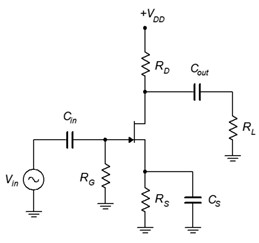
Figure 2.8.1 - For the amplifier of Figure 11.8.2 , determine 𝑍𝑖𝑛 and 𝑉𝑜𝑢𝑡. 𝑉𝑖𝑛= 60 mV, 𝐼𝐷𝑆𝑆 = 10 mA, 𝑉𝐺𝑆(𝑜𝑓𝑓) = −3 V, 𝑉𝐷𝐷 = 20 V, 𝑉𝑆𝑆 = −6 V, 𝑅𝐺 = 270 k Ω , 𝑅𝐷 = 2 k Ω , 𝑅𝐿 = 4 k Ω , 𝑅𝑆 = 1.8 k Ω , 𝑅𝑆𝑊 = 200 Ω .
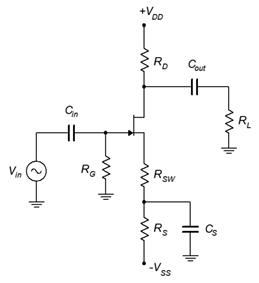
Figure 2.8.2 - For the amplifier of Figure 11.8.2 , determine 𝑍𝑖𝑛 and 𝐴𝑣. 𝐼𝐷𝑆𝑆 = 12 mA, 𝑉𝐺𝑆(𝑜𝑓𝑓) = −2 V, 𝑉𝐷𝐷 = 18 V, 𝑉𝑆𝑆 = −4 V, 𝑅𝐺 = 330 k Ω , 𝑅𝐷 = 2.2 k Ω , 𝑅𝐿 = 10 k Ω , 𝑅𝑆 = 3 k Ω , 𝑅𝑆𝑊 = 100 Ω .
- For the amplifier of Figure 11.8.3 , determine 𝑍𝑖𝑛 and 𝐴𝑣. 𝐼𝐷𝑆𝑆 = 12 mA, 𝑉𝐺𝑆(𝑜𝑓𝑓) = −2 V, 𝑉𝐷𝐷 = 18 V, 𝑉𝐸𝐸 = −4 V, 𝑅𝐺 = 390 k Ω , 𝑅𝐷 = 2.2 k Ω , 𝑅𝐸 = 1 k Ω , 𝑅𝐿 = 20 k Ω.
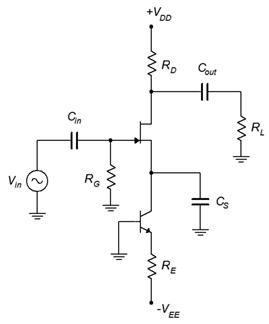
Figure 2.8.3 - For the amplifier of Figure 11.8.3 , determine 𝑍𝑖𝑛 and 𝑉𝑜𝑢𝑡. 𝑉𝑖𝑛 = 70 mV, 𝐼𝐷𝑆𝑆 = 12 mA, 𝑉𝐺𝑆(𝑜𝑓𝑓) = −2 V, 𝑉𝐷𝐷 = 18 V, 𝑉𝐸𝐸 = −4 V, 𝑅𝐺 = 390 k Ω , 𝑅𝐷 = 2.2 k Ω , 𝑅𝐿 = 20 k Ω.
- For the circuit of Figure 11.8.4 , determine 𝑍𝑖𝑛 and 𝐴𝑣. 𝐼𝐷𝑆𝑆 = 12 mA, 𝑉𝐺𝑆(𝑜𝑓𝑓) = −2 V, 𝑉𝐷𝐷 = 10 V, 𝑅𝐺 = 220 k Ω , 𝑅𝐿 = 3.3 k Ω , 𝑅𝑆 = 330 Ω .

Figure 2.8.4 - For the circuit of Figure 11.8.4 , determine 𝑍𝑖𝑛 and 𝑉𝑜𝑢𝑡. 𝑉𝑖𝑛 = 200 mV, 𝐼𝐷𝑆𝑆 = 15 mA, 𝑉𝐺𝑆(𝑜𝑓𝑓) = −3 V, 𝑉𝐷𝐷 = 12 V, 𝑅𝐺 = 270 k Ω , 𝑅𝐿 = 1.8 k Ω , 𝑅𝑆 = 270 Ω .
- For the circuit of Figure 11.8.5 , determine 𝑍𝑖𝑛 and 𝑉𝑜𝑢𝑡. 𝑉𝑖𝑛 = 100 mV, 𝐼𝐷𝑆𝑆 = 10 mA, 𝑉𝐺𝑆(𝑜𝑓𝑓) = −3 V, 𝑉𝐷𝐷 = 15 V, 𝑉𝑆𝑆 = −6 V, 𝑅𝐺 = 470 k Ω , 𝑅𝐿 = 4 k Ω , 𝑅𝑆 = 1.8 k Ω.
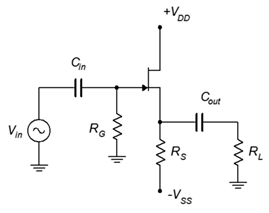
Figure 2.8.5 - For the circuit of Figure 11.8.5 , determine 𝑍𝑖𝑛 and 𝐴𝑣. 𝐼𝐷𝑆𝑆 = 18 mA, 𝑉𝐺𝑆(𝑜𝑓𝑓) = −2 V, 𝑉𝐷𝐷 = 14 V, 𝑉𝑆𝑆 = −6 V, 𝑅𝐺 = 360 k Ω , 𝑅𝐿 = 10 k Ω , 𝑅𝑆 = 1 k Ω .
- For the circuit of Figure 11.8.6 , determine 𝑉𝑜𝑢𝑡. 𝑉𝑖𝑛 = 100 mV, 𝑟𝐷𝑆(𝑜𝑛) = 50 Ω , 𝑟𝐷𝑆(𝑜𝑓𝑓) = 1 M Ω , 𝑉𝐺𝑆(𝑜𝑓𝑓) = −3 V, 𝑉𝐶 = −6 V, 𝑅𝐺 = 270 k Ω , 𝑅𝐷 = 6.8 k Ω .
- For the circuit of Figure 11.8.6, determine 𝑉𝑜𝑢𝑡. 𝑉𝑖𝑛 = 100 mV, 𝑟𝐷𝑆(𝑜𝑛) = 75 Ω , 𝑟𝐷𝑆(𝑜𝑓𝑓) = 750 k Ω , 𝑉𝐺𝑆(𝑜𝑓𝑓) = −3 V, 𝑉𝐶 = 0 V, 𝑅𝐺 = 180 k Ω , 𝑅𝐷 = 5.1 k Ω .
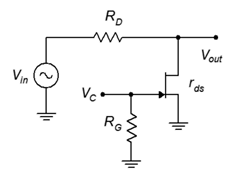
Figure 2.8.6
Design Challenge Problems
- Following the circuit of Figure 11.8.2 , design an amplifier with a gain of at least 4 and an input impedance of at least 300 k Ω. 𝑅𝐿 = 10 k Ω . The JFET has the following parameters: 𝑉𝐺𝑆(𝑜𝑓𝑓) = −2 V, 𝐼𝐷𝑆𝑆 = 15 mA. Try to use standard resistor values.
- Using the circuit of Figure 11.8.4 , design a follower with a gain of at least 0.7 and an input impedance of at least 500 k Ω. 𝑅𝐿 = 1 k Ω . The JFET has the following parameters: 𝑉𝐺𝑆(𝑜𝑓𝑓) = −3 V, 𝐼𝐷𝑆𝑆 = 20 mA. Try to use standard resistor values.
Computer Simulation Problems
- Utili 𝑍𝑖𝑛 g manufacturer’s data sheets, find devices with the following specifications (typical) and verify them using the measurement techniques presented in the prior chapter. Device 1: 𝑉𝐺𝑆(𝑜𝑓𝑓) = −2 V, 𝐼𝐷𝑆𝑆 = 15 mA. Device 2: 𝑉𝐺𝑆(𝑜𝑓𝑓) = −3 V, 𝐼𝐷𝑆𝑆 = 20 mA.
- Using the device model from the preceding problem, verify the design of Problem 13.
- Using the device model from Problem 15, verify the design of Problem 14.

